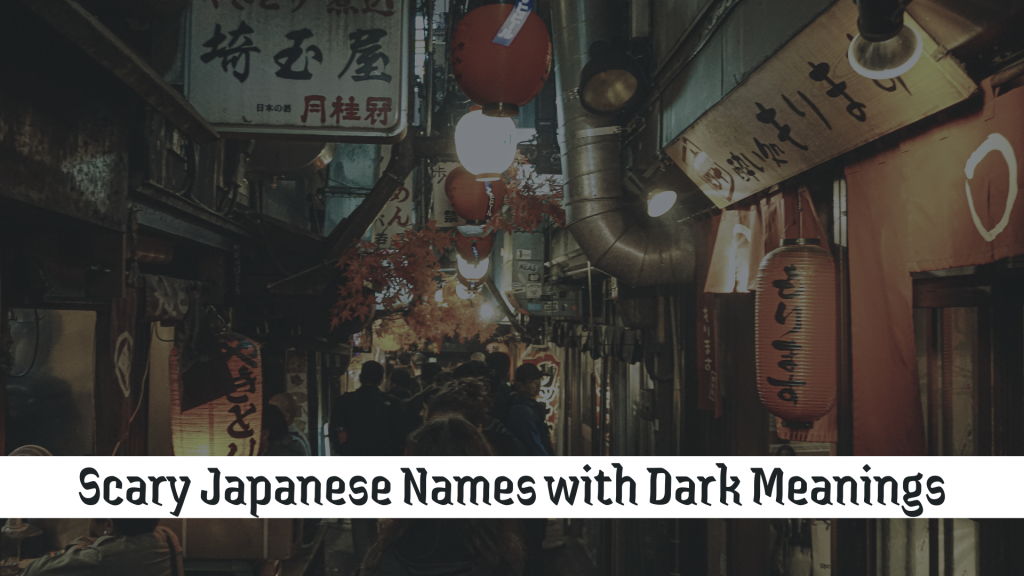Japanese names carry deep meanings, often reflecting qualities that are admired or notable. But some names tap into darker themes, offering a glimpse into the more mysterious or even sinister aspects of Japanese culture. Whether you’re naming a character in a story, a game avatar, or just exploring, these dark and evocative names have a lot to reveal. This article explores an array of Japanese names for boys, girls, and even last names, each with a dark or sinister meaning. Let’s uncover the stories these names tell.
Overview of Dark and Evil Japanese Names
Dark and evil Japanese names come from myths, folklore, and history. They carry meanings of death, darkness, and doom.Names like Makoto (誠, twisted truth), Akuma (悪魔, demon), Kuragari (暗がり, darkness), and Jigoku (地獄, hell) sound ominous. Some belonged to ruthless samurai. Others described spirits feared in ancient times. These names bring mystery, fear, and power.
Japanese Boys Names With Dark Meanings
Japanese boy names with dark meanings have a unique charm. Many of these names come from folklore, mythology, or nature’s mysterious side. Some reflect the power of night, shadows, or even tragic beauty. Whether you’re looking for a name that hints at mystery or one that carries an air of strength, these names have a deep and haunting appeal. They’re perfect for those who love names with a touch of darkness.
- Aokigahara (青木ヶ原) – Blue Tree Meadow (Japan’s haunted forest)
- Aragami (荒神) – Violent God
- Ayakashi (妖) – Vengeful Spirit
- Burakku (ブラック) – Black
- Daku (濁) – Impurity
- Fukushū (復讐) – Revenge
- Gankona (頑固な) – Stubborn, Unyielding
- Gōka (業火) – Hellfire
- Hakumei (薄明) – Dusk, Twilight
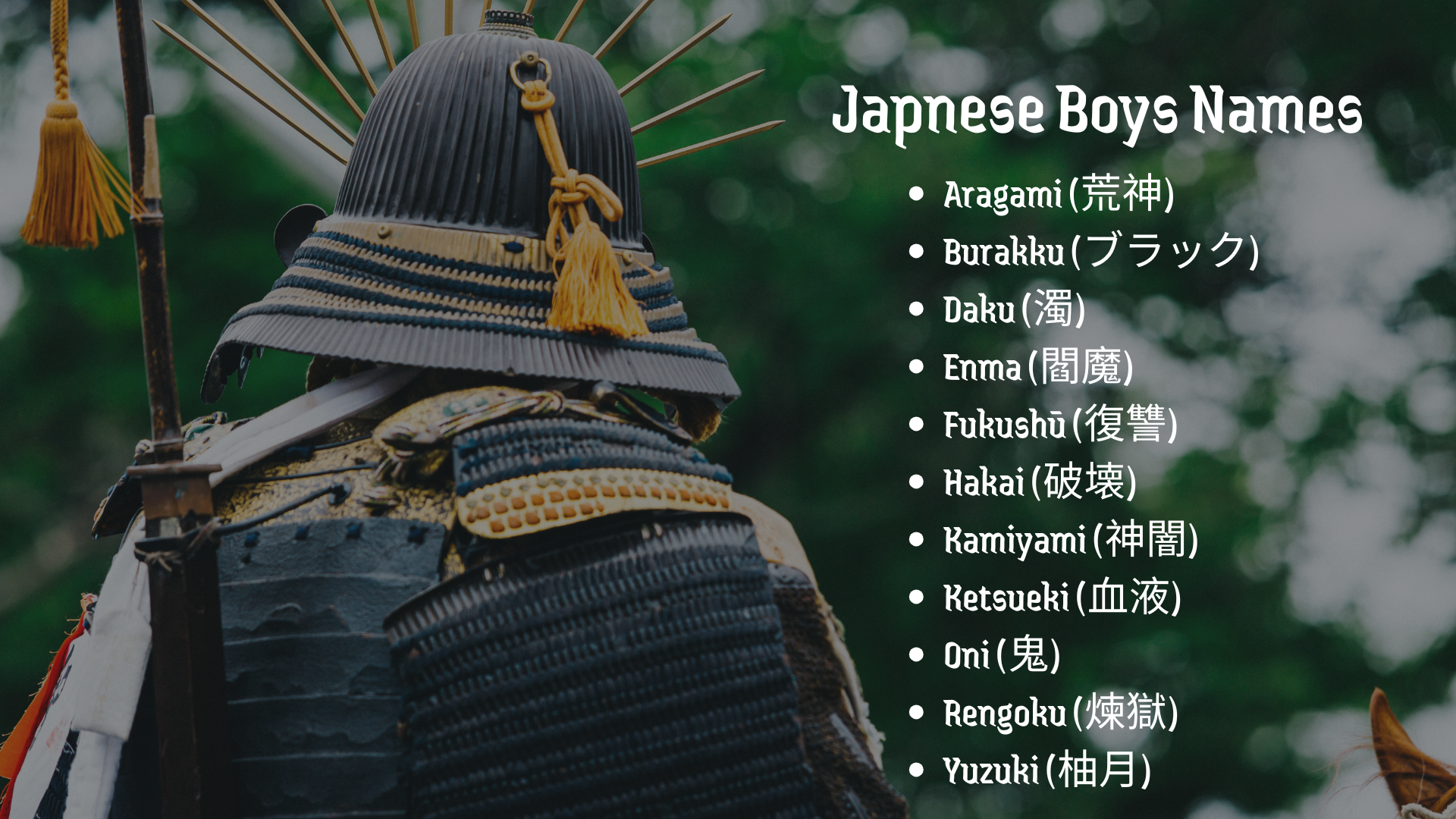
- Hakai (破壊) – Destruction
- Hantā (ハンター) – Hunter
- Hiei (飛影) – Flying Shadow
- Hisoka (密か) – Secret, Stealthy
- Hoshikuzu (星屑) – Stardust, Ruins of Stars
- Inazuma (稲妻) – Lightning Bolt
- Jashin (邪神) – Evil God
- Jigoku (地獄) – Hell
- Kagerō (陽炎) – Mirage, Heat Haze
- Kageya (影夜) – Shadow Knight
- Kaibutsu (怪物) – Monster
- Kamiyami (神闇) – Divine Darkness
- Karasu (烏) – Crow, Omen of Death
- Kashin (禍神) – Curse God
- Kazan (火山) – Volcano
- Kiba (牙) – Fang
- Kiryuu (鬼龍) – Demon Dragon
- Kiyoharu (清春) – Pure Spring (Irony in Darkness)
- Kuro (黒) – Black
- Kuroi (黒い) – Dark, Sinister
- Kurō (苦労) – Suffering
- Kyōfu (恐怖) – Horror
- Magatsu (禍津) – Bringer of Disaster
- Makura (枕) – Eternal Sleep
- Mamoru (守る) – To Protect (Irony in Dark Context)
- Mikazuki (三日月) – Crescent Moon
- Mugen (無限) – Infinite Darkness
- Nagi (凪) – Silent Calm Before a Storm
- Naraku (奈落) – Abyss, Hell
- Oni (鬼) – Demon
- Orochi (大蛇) – Giant Serpent
- Reikon (霊魂) – Lost Soul
- Rikuto (陸翔) – Land of Shadows
- Ryūketsu (流血) – Bloodshed
- Sabaku (砂漠) – Desert, Lifeless Land
- Sanzu (三途) – Sanzu River (Japanese Styx)
- Shikkoku (漆黒) – Jet Black
- Shinigami (死神) – Death God
- Shinsō (深層) – Deep Abyss
- Shishio (獅子王) – Demon Lion King
- Shoku (蝕) – Eclipse
- Shuuran (修羅) – Chaos and Bloodshed
- Soutan (争端) – Conflict, Dispute
- Taiki (大鬼) – Great Demon
- Tanken (探検) – Exploration into the Unknown
- Tatsumaki (竜巻) – Dragon Tornado
- Tensei (転生) – Reincarnation, Cycle of Death
- Toketsu (凍結) – Frozen
- Tsunayoshi (綱吉) – Fate of Chains
- Ugetsu (雨月) – Rainy Moon
- Urami (恨み) – Resentment, Grudge
- Uryuu (憂流) – Sorrowful Flow
- Usotsuki (嘘つき) – Liar
- Yamikage (闇影) – Dark Shadow
- Yamiryuu (闇竜) – Dark Dragon
- Yasha (夜叉) – Demon Warrior
- Yogen (予言) – Prophecy of Doom
- Yoru (夜) – Night
- Yoruha (夜刃) – Night Blade
- Yoruichi (夜一) – First of the Night
- Zankoku (残酷) – Cruelty
- Zekka (絶火) – Eternal Fire
- Zetsubo (絶望) – Despair
- Zettai (絶対) – Absolute End
- Zuishin (随身) – Ominous Omen
- Akuryō (悪霊) – Evil Spirit
- Kamen (仮面) – Masked One
- Fuyuto (冬翔) – Winter Flight
- Shura (修羅) – Carnage
- Raiun (雷雲) – Thunderstorm Cloud
- Higure (日暮れ) – Sunset Darkness
- Kuragari (暗がり) – Deep Gloom
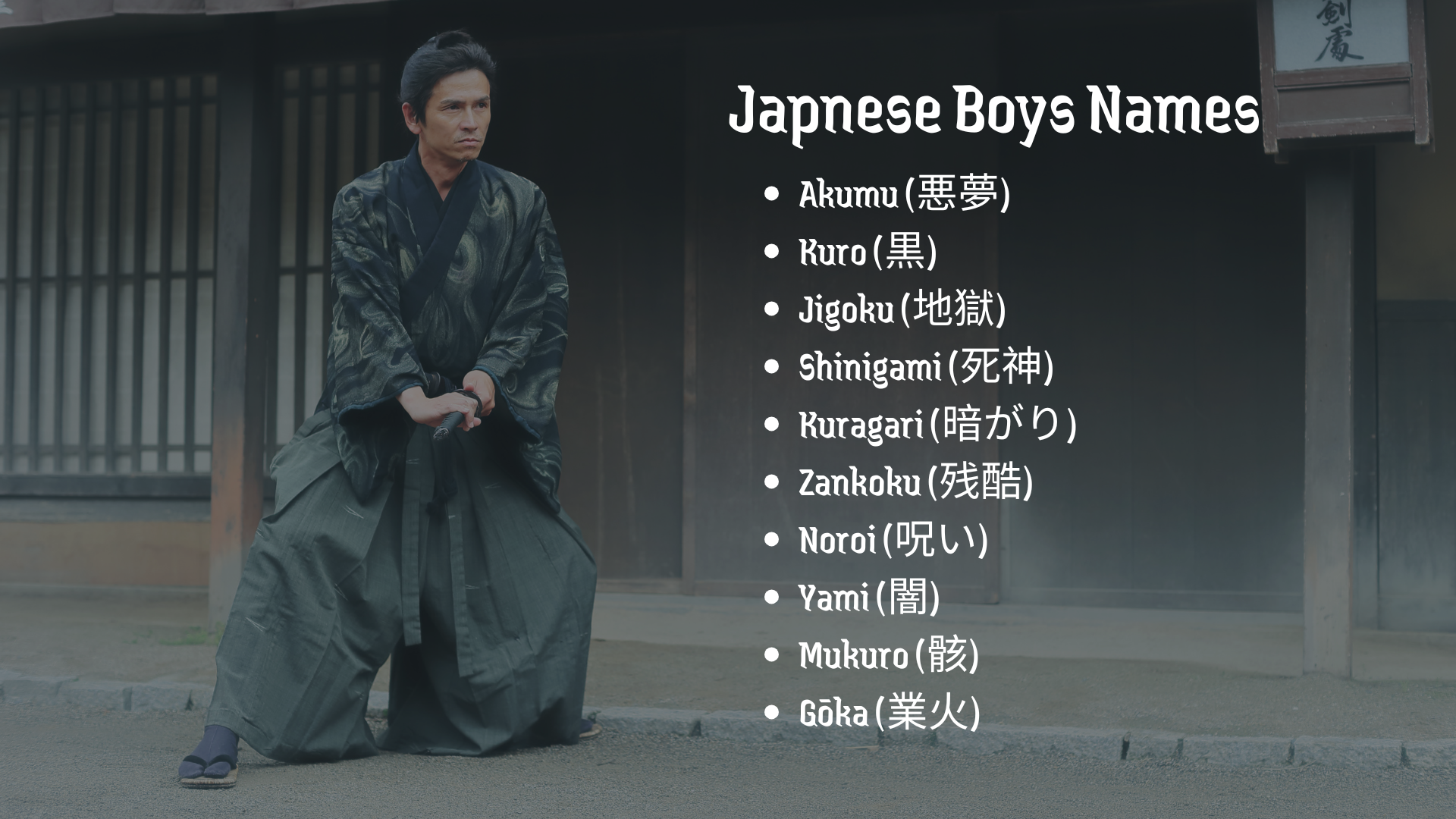
- Yakan (Night) – Nocturnal
- Kanashimi (悲しみ) – Saro
- Atsushi (厚司) – Deep Darkness
- Shikya (死去) – Death
- Yuugen (幽玄) – Mysterious Darkness
- Zansatsu (斬殺) – Brutal Killing
- Ikari (2007) – 2015
- Rinne (輪廻) – Cycle of Rebirth (and Death)
- Fuketsu (不潔) – Impure
- Norowareta (cursed) – Cursed
- Muon (無音) – Silent Death
- Reibai (霊媒) – Spirit Medium
- Tsukuyomi (月読) – Moonlit Darkness
- Yogensha (預言者) – Prophet of the End
Discover Evil Name that Means Darkness .
Japanese Girl Names with Dark Meaning
Dark and beautiful, these Japanese girl names tell stories. Some whisper of the moon’s quiet glow, while others echo legends of forgotten goddesses or powerful spirits. Shadows, sorrow, and mystery often shape their meanings. These names are not just eerie—they carry grace and depth, perfect for someone drawn to the beauty in darkness. If you want a name with history, emotion, and a touch of the unknown, you’ll find it here.
- Akahana (赤花) – Red Flower (Metaphor for Blood)
- Akari (明かり) – Dim Light
- Akumu (悪夢) – Nightmare
- Ameonna (雨女) – Cursed Rain Woman
- Ayame (菖蒲) – “Iris (Flower of Death)”
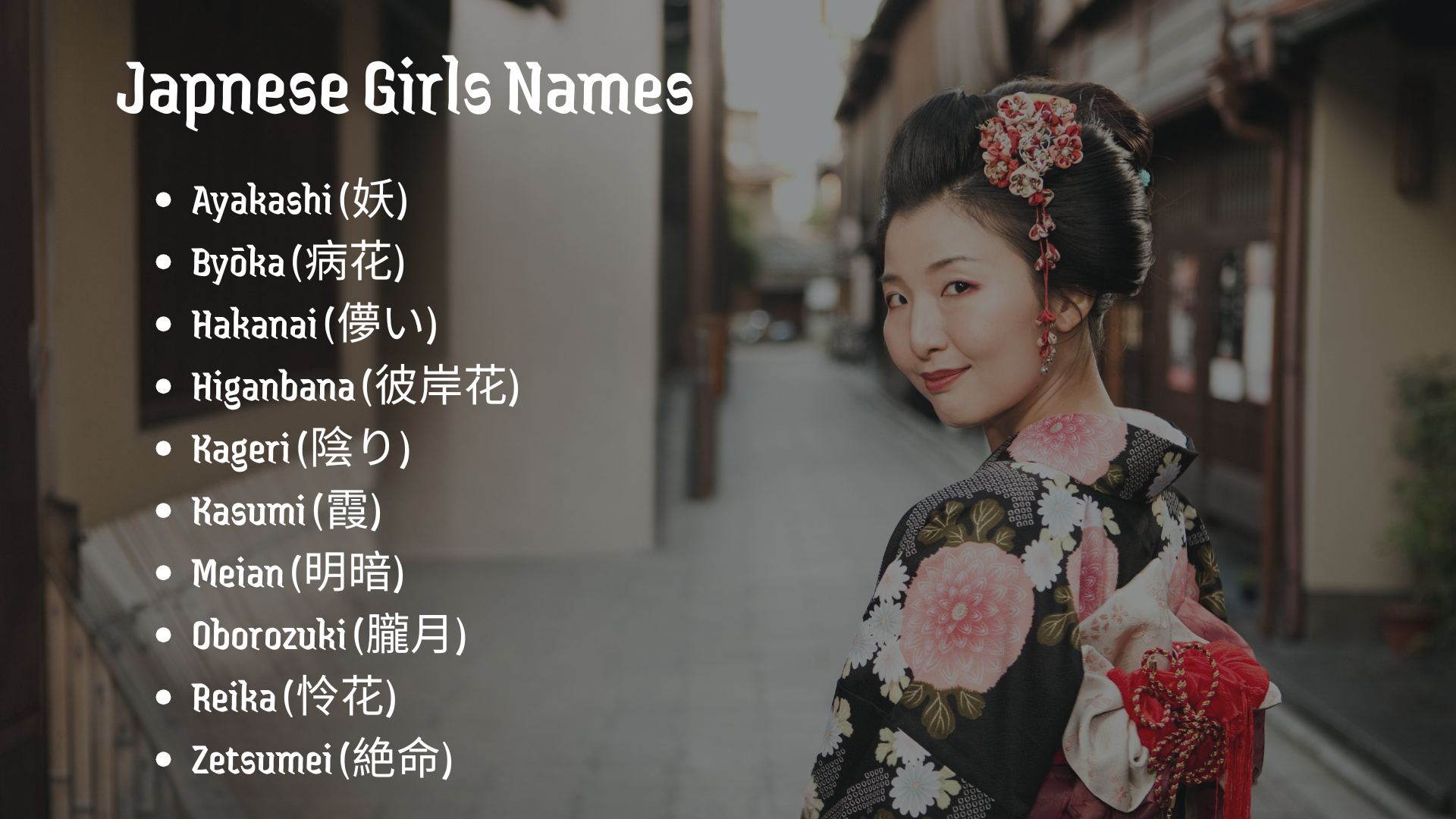
- Byōka (病花) – “Sick Flower”
- Chikage (千影) – “Thousand Shadows”
- Chinmoku (沈黙) – “Silence”
- Daku (濁) – “Darkness, Impurity”
- Enenra (煙々羅) – “Smoke Demon”
- Fujiwara (藤原) – “Wisteria of Death”
- Fushimi (伏見) – “Hidden Truth”
- Hakanai (儚い) – “Ephemeral, Fleeting”
- Hayami (速見) – “Quick Death”
- Hikage (日陰) – “Shadow, Hidden from Light”
- Himiko (卑弥呼) – “Dark Queen”
- Himura (氷村) – “Frozen Village”
- Honoka (炎花) – “Burning Flower”
- Izanami (伊邪那美) – “Goddess of Death”
- Jinmei (人命) – “Human Life (Fleeting)”
- Kageri (陰り) – “Darkness, Gloom”
- Kagome (籠目) – “Cage, Entrapment”
- Kahoru (香折) – “Fragrance of Death”
- Kanashii (悲しい) – “Sorrowful”
- Kaonashi (顔無し) – “Faceless”
- Kasumi (霞) – “Misty Phantom”
- Ketsueki (血液) – “Blood”
- Kirai (嫌い) – “Hate”
- Kogarashi (木枯らし) – “Withering Cold Wind”
- Kuragari (暗がり) – “Gloom”
- Kurohana (黒花) – “Black Flower”
- Kuroi (黒い) – “Dark”
- Kuronami (黒波) – “Dark Waves”
- Mahō (魔法) – “Dark Magic”
- Meian (明暗) – “Light and Dark”
- Mitsuko (満子) – “Child of Darkness”
- Mujo (無常) – “Impermanence, Death”
- Namida (涙) – “Tears”
- Narumi (鳴海) – “Crying Sea”
- Nozomi (望み) – “False Hope”
- Noroi (呪い) – “Curse”
- Reika (怜花) – “Ghostly Flower”
- Sanae (早苗) – “Wilting Seedling”
- Shizume (鎮女) – “Silent Woman”
- Sumire (菫) – “Dark Violet Flower”
- Tsubaki (椿) – “Camellia (Flower of Death)”
- Tsukiyo (月夜) – “Moonlit Night”
- Yamiyo (闇夜) – “Dark Night”
- Yoru (夜) – “Night”
- Yūrei (幽霊) – “Ghost”
- Tenshi (天使) – “Fallen Angel”
- Urami (恨み) – “Grudge”
- Akegare (穢れ) – “Impurity”
- Higanbana (彼岸花) – “Red Spider Lily (Flower of Death)”
- Izayoi (十六夜) – “Sixteenth Night (Unlucky)”
- Sakuya (咲夜) – “Night Bloom”
- Mikadzuki (三日月) – “Crescent Moon”
- Shinku (真紅) – “Crimson Blood”
- Yami (闇) – “Darkness”
- Maboroshi (幻) – “Phantom”
- Zankoku (残酷) – “Cruelty”
- Shion (紫苑) – “Aster (Flower of Remembrance)”
- Himei (悲鳴) – “Scream”
- Tsumetai (冷たい) – “Cold, Unfeeling”
- Unmei (運命) – “Fate (Tragic Destiny)”
- Yūgure (夕暮れ) – “Dusk”
- Kawaki (渇き) – “Thirst (for Blood or Sorrow)”
- Oboro (朧) – “Hazy, Faint”
- Gensō (幻想) – “Illusion”
- Sasame (細雨) – “Drizzle (Loneliness)”
- Shinkirō (蜃気楼) – “Mirage”
- Tobari (帳) – “Curtain of Night”
- Kurai (暗い) – “Gloomy”
- Sabishii (寂しい) – “Lonely”
- Jiko (事故) – “Tragedy”
- Amai (甘い) – “Bitterly Sweet”
- Reikoku (冷酷) – “Heartless”
- Samae (覚醒) – “Awakening (To the Dark)”
- Kuraihana (暗い花) – “Dark Blossom”
- Mizuki (水月) – “Water Moon (Illusion)”
- Kaika (開花) – “Doomed Bloom”
- Yomigaeri (蘇り) – “Revival from Death”
- Shūmatsu (終末) – “End, Doom”
- Hitomi (瞳) – “Gazing Abyss”
- Satsuki (皐月) – “Fifth Month (Month of Mourning)”
- Tsuyoi (強い) – “Relentless”
- Anzen (暗然) – “Gloomy Silence”
- Fūka (風華) – “Wind of Death”
- Zetsumei (絶命) – “Certain Death”
- Ketsubetsu (決別) – “Separation by Death”
- Yukiko (雪子) – “Child of the Snow (Cold Fate)”
- Ashi (葦) – “Reeds (Swamps of Death)”
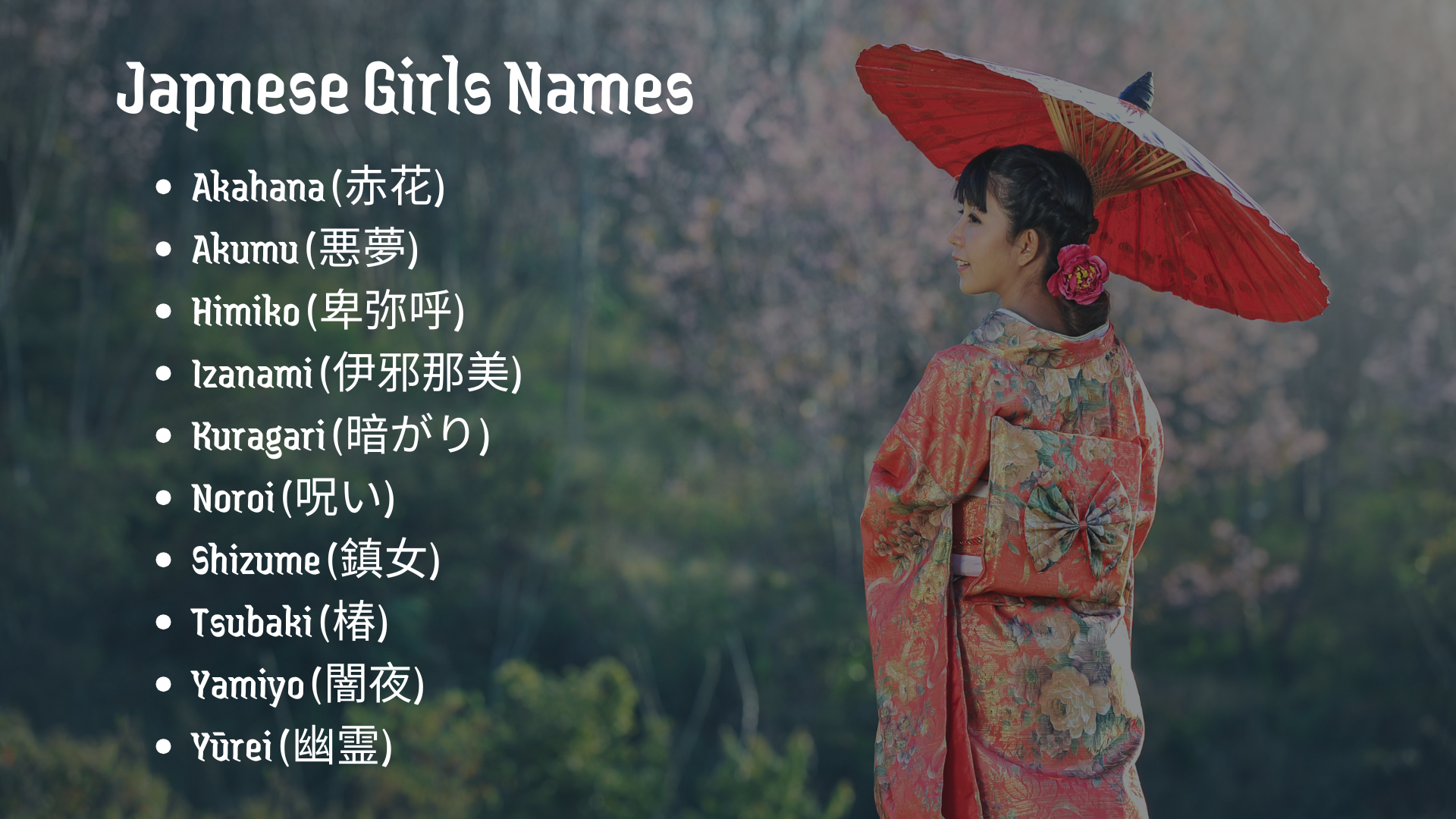
- Mugen (夢幻) – “Dreamlike Illusion”
- Shikabane (屍) – “Corpse”
- Norowareta (呪われた) – “Cursed One”
- Tsukushi (筑紫) – “Land of Death”
- Gekka (月下) – “Moonlit Horror”
- Shimeki (締め木) – “Torment”
- Taimatsu (松明) – “Burning Torch”
- Shin’en (深淵) – “Abyss”
Japanese Last Names Dark Meaning
Japanese last names often connect to nature, history, and legend. Some have deep, dark roots—linked to storms, death, or hidden places. These surnames may have belonged to samurai, outcasts, or families tied to mysterious lands. They carry weight and history, making them intriguing for anyone fascinated by the darker side of language. Whether you seek something bold or subtle, these names have a rich, shadowy depth that makes them unforgettable
| Japanese Name | Meaning |
|---|---|
| Akaishi (赤石) | Red Stone (Bloodstone) |
| Arakawa (荒川) | Rough River |
| Byakuren (白蓮) | White Lotus of Death |
| Chisame (血雨) | Blood Rain |
| Daimon (大門) | Great Gate (Gates of the Underworld) |
| Enma (閻魔) | King of Hell |
| Fujimoto (藤本) | Origin of Wisteria (Symbol of Death) |
| Gojō (五条) | Five Death Paths |
| Hakumei (薄命) | Short Life, Tragic Fate |
| Higanbana (彼岸花) | Red Spider Lily (Flower of Death) |
| Ishikawa (石川) | Rocky River of Death |
| Jigokugawa (地獄川) | River of Hell |
| Kagutsuchi (迦具土) | God of Destructive Fire |
| Kurobane (黒羽) | Black Wings (Fallen Angel) |
| Mukuro (骸) | Corpse |
| Narakawa (奈落川) | Abyss River |
| Onizuka (鬼塚) | Demon Mound |
| Rengoku (煉獄) | Purgatory |
| Shikoku (死国) | Land of Death |
| Yūrei (幽霊) | Ghost |
Conclusion
Diving into dark Japanese names offers a unique perspective on the culture and its language. Each name, whether for boys, girls, or families, carries a depth that goes beyond the surface, often touching on intense or profound themes. These names can add significant depth to stories or characters, enriching the narrative with their cultural significance and intrinsic meanings. So, whether you’re crafting a novel, developing a game, or simply satisfying your curiosity, these names provide a fascinating exploration into the darker side of Japanese nomenclature. Ready to explore the intriguing world of dark Japanese names?
Great names live in Akar Print. Don’t miss out!
Basmah Ali is a skilled copywriter with a degree from the University of Warwick. She crafts clear, engaging content that connects with readers and gets results. When she’s not writing, she’s likely reading or exploring new ideas in marketing.

